Hear Her Roar
Lion Babe is shaking up the music biz as R&B's buzziest duo. Here, they rock their newfound fame—and spring's best new trends.
In 2013, "Treat Me Like Fire" dropped on SoundCloud and the internet, hypnotized, begged to know: Who's that girl? If you're still in the dark, she's Jillian Hervey, professional-dancer-turned singer and one half of NYC-based R&B duo Lion Babe, alongside producer Lucas Goodman.
With her buttery-smooth voice (it draws comparisons to the likes of Erykah Badu and Lauryn Hill), mesmerizing choreography, and larger-than-life cloud of golden ringlet curls, she was bound for the stage from birth. She is, after all, the daughter of actress, singer, and former Miss America Vanessa Williams.
Since that first breakout hit, Lion Babe has shaken up the neo-soul category with fierce numbers like "Jump Hi," a please-proceed-to-the-dance-floor track featuring Childish Gambino, and "Wonder Woman," a mighty anti-catcalling anthem produced by their (and everybody's) dream collaborator, Pharrell.
But with fans (us included!) eagerly awaiting a full record, the pair finally unveiled their debut album, Begin, last month. An infectious, genre-bending, and fluid mix of their biggest hits thus far and new material, it's already catapulting them to new heights.
Here, Hervey and Goodman talk about their serendipitous meet cute, the evolution of Lion Babe, industry sexism, and more while modeling spring's hottest '70s inspired trends.
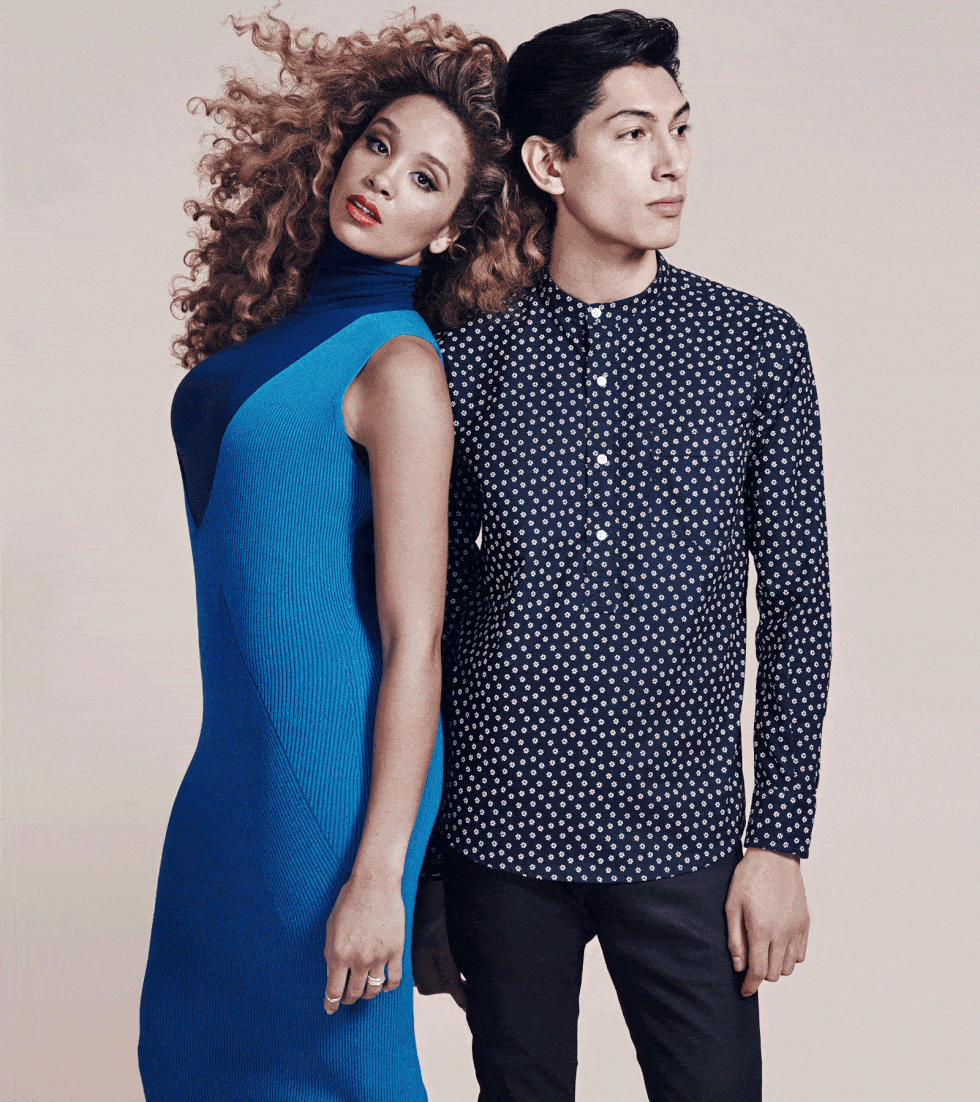
Marie Claire: How did you guys meet and start collaborating?
Jillian Hervey: Basically, my senior year of high school, I was going to look at prospective colleges and I went to visit Northeastern University because one of my friends was going. My dad dropped me off and I went to stay the weekend. It was my first weekend being at a college staying in a dorm room and I went to my first college party. It was definitely a bro fest. Lucas was there at the party and he knew my friend, Zach, who ended up being the guy who connected us. The party was smelly, lots of beer, gross, and I was just way overdressed. I was in too nice of an outfit for what I was doing and I think I just was either so bored or awkward that I started to listen to the music. By chance, I heard a song and I didn't know what it was. So, I asked my friend 'What's this?' and he was like, 'The dude over there on the couch made it.' At this point, I didn't really know anyone who made beats or music, so I just kind of went up to him and was like 'Hi, I'm Jill, I like your music.' Then he was like, 'Oh, thanks,' and that was it.
Stay In The Know
Get exclusive access to fashion and beauty trends, hot-off-the-press celebrity news, and more.
We didn't talk for like a couple of years after that, though I had followed him on Facebook under his producer name, Astro Raw. I ended up picking a school in New York, so I was there and every now and then. I would see he was playing but never went because I was like 'I don't even know this guy.' I kind of forgot about it. And then, my same friend ended up moving to New York after graduating and we kind of just relinked. In New York everyone just kind of knows each other, so we just started, kind of, hanging out. I was working on a piece for one of the things I was dancing to and I needed to have original music. I didn't know where to begin, I'm so bad at computers, and I remembered that he actually made music. So I asked him if he'd be interested in scoring and he said yes. The piece was jungle-inspired and he made this pounding, heartbeat thing, and it went really well. And then from there, we just kind of started talking about making more stuff. I was curious because I hadn't really known anyone to do just that, so I would stop in on his sessions with his rapper friends, and then one day, I told him I'm looking to sing. He told me to try it out and then we made 'Treat Me Like Fire' and everything started."
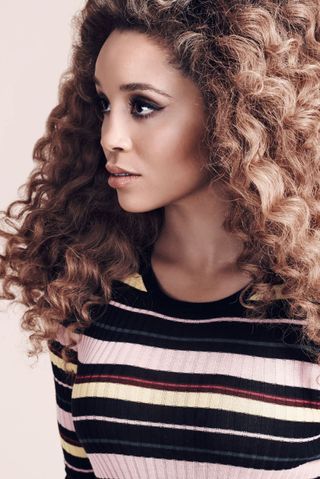
MC: What are your earliest memories of falling in love with music?
JH: I've always been kind of surrounded by music my whole life, so my earliest memories of it were just hearing it in the house. Both of my mom's parents were music teachers, so I was hearing the fundamentals of playing the piano, what notes are, and all those things very early on. I grew up as a dancer, and music and dance are so closely tied, that in ballet class you're listening to all this classical music, and in modern class you're working with a live drummer. It was something that always made me feel really comfortable and I've had a connection to since the beginning."
Lucas Goodman: "My parents were also both big music people. They love listening to music, going to shows, and were always playing music in the house growing up. For me, it really became a thing when I started playing guitar when I was eleven, and that's when you start really identifying with the certain music you feel is 'your music.' Around the same age, my friends and I started picking up instruments and playing. Every Friday we'd go over to someone's house and there would be a jam. Later on, in high school and college, I got really into making beats, and when I was a freshman.
MC: What were the soundtracks to your childhoods?
LG: The very first thing I listened to, where I was like, 'Damn, I want that,' was The Lion King cassette because I wanted "Hakuna Matata." And then it was like, if you're going to play guitar, you've got to listen to Jimi Hendrix, Led Zeppelin, and The Rolling Stones, so I definitely had all those CDs, but there was also Rage Against the Machine and the Red Hot Chili Peppers. In the beginning of high school, I got really into buying hip-hop albums, definitely starting with the older, classic ones, like Tribe, Wu-Tang, or the first Biggie album. Artists like that definitely were a huge part of it, along with all sorts like The White Stripes, The Strokes, MF Doom, and Madlib. Something I remember listening to a lot, especially junior year of high school, was Bob Marley's album, Kaya. We'd get together on Thursdays, do whatever we did, and go listen to that album. From there, everything after was just building upon those types of vibes.
JH: Between my mom and dad, I would hear a lot of Earth, Wind, and Fire. My mom loved Chaka Khan, so that was on in the car a lot. Of course the Disney movies, you know all the soundtracks, and anything Gene Kelly and Fred Astaire were doing–Singing in the Rain was one of my favorite musicals I used to watch a lot because my mom came from a theatre background. And then, you know, I think just being a '90s kid–I was not a Backstreet Boys girl, I was definitely into NSYNC.
Half of my family is in Los Angeles, so my cousin was the first person to play me, like, Snoop Dogg, and I would always feel like 'Omg I shouldn't be listening to this,' and my other cousin was the first to introduce me to Aaliyah, so every time I'd go to the West Coast, I'd get those West Coast vibes. I definitely listened to Lauryn Hill–her's was like the first album I bought myself. Brandy's Never Say Never and Lauryn Hill's The Miseducation of Lauryn Hill were always in rotation for a couple of years. It's a lot of things, we're very eclectic. Like Lucas said, because of the time we're in, it's so easy to just blend all of it together and it's kind of like you're listening to everything all at once.
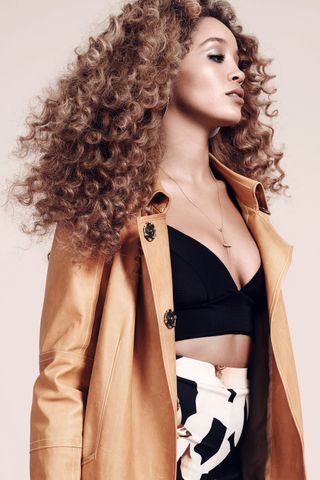
MC: And the name Lion Babe, we read it was inspired by a trip to South Africa. Could you talk about that?
JH: I'm a Gemini and he's a Leo, so we definitely wanted some duality. We definitely balance each other out in a lot of ways, but we're also very different. South Africa was something that just kind of hit me. I'm a diehard animal lover—I've always loved animals—but it was just one of those trips that I felt like I was going back to the beginning of where earth started. At the time, where a lot of stuff was brewing anyway, to be in such a beautiful and barren land, and just looking at how life began with all these creatures, I just started to really think about animals and time and just all of it. I think the lion, besides the elephant, was the one animal that I just started thinking about so much. I remember just looking at this lioness, she was staring at me, and we just had this weird connection. I don't know if she thinks there was a connection, but for me, I never forgot it. I just felt like, I want to carry that spirit. It was a beautiful metaphor for how I was starting to see myself.
I remember just looking at this lioness, she was staring at me, and we just had this weird connection.
From there, I just wanted to shed everything and do the things I really wanted to do. All the things I was scared of, I just wanted to try. It was like a clearing. And then for the name Lion Babe, we are a little avant-garde, a little left. And with bands like Blondie, Pink Floyd, or Jamiroquai, you don't know they're bands, you just kind of hear the name and you're like 'What is it?' so that was the kind of thing we wanted to do. To have a name that pulled people in and I could kind of be the front of it. And, yeah, the opposite of a lion is a babe. Being vulnerable and strong is a complicated thing, but that's who we are.
MC: The release of "Treat Me Like Fire"is what put you guys on the map. How did things evolve from there?
LG: We're so blessed to be able to use our creativity in our everyday lives. Obviously with that comes a lot of other responsibilities and things you've got to do to keep that going, which is all good. Everyday, there are so many things to learn—just being officially in the music industry and going from making tunes in my bedroom to show to my friends to like, there's this label A&R person.
I wanted to reinvent my whole life and change my hair—I'd had brown, straight extensions forever.
JH: I think my life dramatically shifted when I met Lucas and it wasn't even planned. I had a very clear vision of what I was going to do. I grew up always wanting to be a dancer and when I went to New York, I fell in love with the idea of performing in all ways. I saw myself traveling with a company or making my own work and being a little weird. I wasn't thinking about the business side of anything, I just knew that I loved dancing. Being in New York, and meeting really amazing, talented, eccentric, and bold people, and just feeling really excited about life, got me really revved up and I just felt like everything was at my fingertips—that I could try anything. I really felt invincible. It was such a shift. I had been with a guy for seven years and I was done with that. I wanted to reinvent my whole life and change my hair—I'd had brown, straight extensions forever—and I just wanted to get rid of that, to shed skin, and really just be independent.
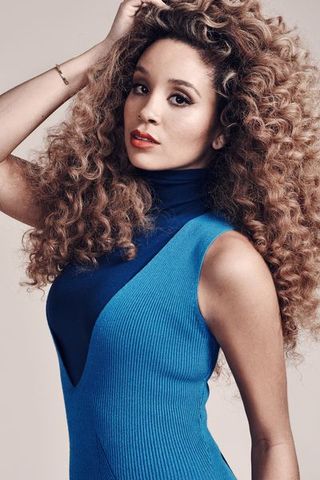
Back then, it's weird, because I wasn't consciously thinking about it and I think that's why the doors opened and I had the opportunity. It was a big shift and I realized that you can plan and think your life is going somewhere, but you also have to surrender to what opportunities present themselves and really go for those as well. The greatest blessing is that, within all of this, I've still been challenged every day to question and show who I am. What kind of art do I want to make? What do I stand for? What inspires me? And then to have people in return respond to that... I think that's the greatest thing because throughout dancing, I'm always looking for that. I'm always looking for people to feel connected to me and inspired in their own right.
More than anything, it's been a transition into embracing my destiny. I have everything around me to be able to do this properly. Whether or not I was hiding from that early on, I think now it's great to feel that way. It's just the journey. You're just always growing. I feel like it's been very fast growth, but super exciting and I know I'll look back and feel like 'Yes, things were stressful, but it was also such an exciting time.'"
MC: The past year has been a breakout year in its own right. What are some of your highlights?
JH: There's been so many, I think [Lucas andI] share this, but for us, Afropunk was a really big moment just because it was in New York. We had spent a lot of time in London, which has been amazing, but also it was kind of a homecoming and we felt so surrounded by a specific community of people who are just so New York, so unapologetically themselves and so creative. To be on stage, to be sharing a stage with Lauryn Hill, Grace Jones, SZA, Kelis, and all these incredible women, I'm like 'When did this happen?' Just to know we were able to do that here, and also, to feel so surrounded and loved. I think I'm always chasing that. I love to feel that I'm not above anyone. These are my people. This is what I love to do. I love to perform for people that get it or just want something interesting.
LG: "On top of that, when we had our listening party for the album release at the beginning of the month, it was a similar feeling of celebration and the vibe of making something that hopefully inspires our peers and fans. We get the same thing back, we also get inspiration.
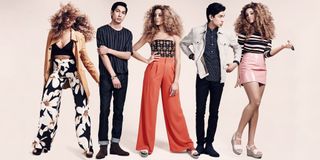
MC: Jillian, how has dancing influenced your career?
JH: The passion started really early, even when I was watching The Wizard of Oz and Singing in the Rain as a little girl. I was always moving around–my mom said I was always the first to do everything. I just always liked to move around. She put me in dance class when I was really young just as a thing to do and I loved it. I remember being excited every time I went, no matter how tired I was–it was the one thing that I always liked doing. It was just a nice way of expressing myself, listening to music, and being able to move around and be free, but also really learning something. It was just a nice balance of training and expressing yourself at the same time. I quit piano and violin because it felt too rigid. It was just my thing, something I fell in love with from a very early age.
As I got older, I started to do it more and more, and I wanted to learn all of the different types. I grew up doing modern, so I wanted to learn ballet, tap, jazz, and African–just everything. The people that have inspired me the most were dancers and choreographers. Even growing up, if I dealt with any pressure to be a certain way, I knew that as an artistic lane, dancing was the one that was a little more freed up–like no one in my family is really doing that, I can be that person. I was also just strong and quick– it wasn't hard for me to learn how to dance. I was a natural at it. I wanted to fight to get into the front. I was just hungry to do it. Now, it's so sacred. It's how I see the world. I can't help but look at people, their physicality, and how they move. It's how I see everything. Architects see the world a certain way, and cooks see and smell the world a certain way. It's always been my lens, what I use to see.
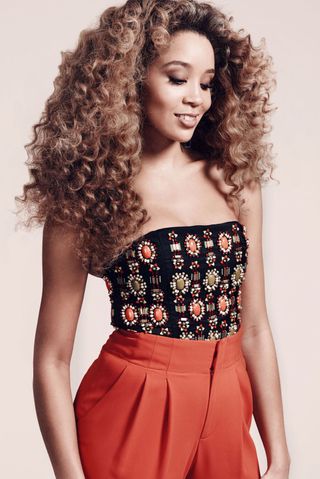
MC: Jillian, how has your mother influenced you and helped you on your journey?
JH: My main goal was to not tell her anything or anyone anything. Even within our family, we like to do it ourselves, we like to be our own boss, and we don't like asking for help. We don't like to mess around and talk about our problems or complain, it's just not anything that we do. So it was like I couldn't even begin to tell my mom I was singing. I didn't want anyone to think that she was trying to get me to sing. I wanted to prove to myself I could do it on my own. I really wanted to do a completely different thing. Even now, it's so funny how much we do have in common and how much her experiences were similar to mine. But I just wanted to be like 'If I'm going to do it, I'm going to write all of my own music, every lyric, and all this stuff.' She is more theatre and Broadway. Her joy and pleasure is interpreting a script or singing a classic song, and all of those things are just a little different because I love the creation process of it and then sharing it, so I think that was the shift. I never thought I was going to be on a label in general, I was like 'Oh, I wouldn't do that,' and then we ended up on the same label basically.
I couldn't even begin to tell my mom I was singing. I didn't want anyone to think that she was trying to get me to sing. I wanted to prove to myself I could do it on my own.
You know, you always want to just do your own thing–I mean some people want to be exactly like their parents–Ibut I wanted to do my own thing and I ended up doing a kind of mix of my mom and dad. I feel like my dad was the more artistic one, creating his own thing, loving to be around people, and all this stuff, doing exciting things, and my mom was more of the performer. So I kind of have gotten the perfect clash of both of them. Now, as we're growing and stuff, it's been amazing to feel so embraced and have them be so excited. I definitely leaned into my dad a little more starting out because once we actually started to get those people knocking on our doors and emailing. We were like 'Who are these people?' My dad just knew. We were so blessed to have a person to help us navigate that.
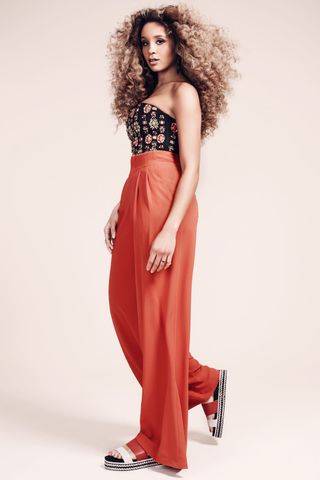
MC: What's the best advice your mom has given you about the business?
JH: My mom has kind of been more of the emotional support system. One time I was really feeling all out of it, just dealing with a lot of cooks in the kitchen and adjusting to what it means to be in the music industry, and I called her. One of the first things she said to me was 'You have to be thankful that these people even like you, no one liked me, at all, I was not really accepted for a very long time.' Not that she was dwelling on it, but she was just like, you know, 'That's one thing that you should embrace because a lot of times people don't like you and don't want anything to do with you, so the fact that these people want to work with you is a good thing.' It's little things like that. She has a few choice words to calm me down. I think it's beautiful that I sometimes, weirdly, see myself in a photo and I'm like 'Omg, that looks like my mom.' It freaks me out and all that stuff, but it's also just a part of my legacy. My mom is one, but there have been performers in my family since as long as we can trace them back, so I think it was kind of inevitable to be artistic and to have a force. We're leaders; we're a family of leaders, so I think it's just part of my genes.
MC: "Got Body" is such an incredible song for self-love and body image. What inspired you to write it?
JH: It's so important to embrace what you have because if you don't, that can be the root of very self-destructive habits, which I think people waste a lot of energy on. But also, it's not their fault–I think the world tries to put people in a box, like this is the only appropriate way to be beautiful. I think growing up, you just deal with 'I'm ugly,' or 'I don't look right,' or 'my hair is wrong,' and it's such a distraction from what can really elevate you.
Growing up, you just deal with 'I'm ugly,' or 'I don't look right,' or 'my hair is wrong,' and it's such a distraction from what can really elevate you.
When I wrote this song I was thinking a lot about my little sister because I see so much of myself in her. I've just seen her grow up and she's kind of the first person that I've ever seen that happen to. Just to kind of see her in that same stage, in middle school, and all that stuff, I kept thinking about that time when you first become a woman and how that dramatically shifts everything and you don't even realize it's happening. I wanted an anthem for her. I love writing to my little sister. It's a very nice, easy kind of way I always find inspiration. It was just one of those things that I felt is so important to have. There's so many people that I feel like as soon as that happens, they can really be and focus on what they want to do.
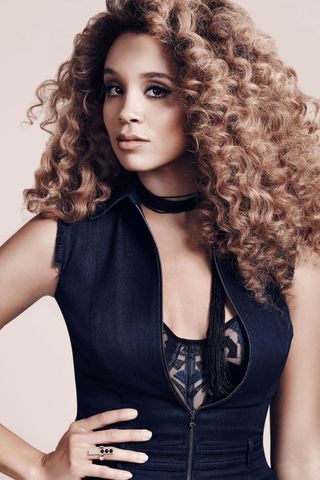
MC: Jillian, could you talk more about your hair identity and how you go about taming your mane day-to-day?
JH: Lion Babe, on a work day, is definitely a process. I obviously could do it by myself, but I definitely prefer not to. It's a lot of hair. I used to start with little pieces, and then it just got bigger, and bigger, and bigger. The main thing I like to do is have a mix of the '70s glamour and emulate a lot of ladies I love, like, Diana Ross, Chaka Khan, Donna Summers. I remember thinking that as a young girl, they were so cool and iconic. I missed that! I had not seen big hair like that in a minute. Along with that, was a very strong statement of what was happening to me internally. I was breaking free, being wild, embracing my instinctual self, and all that, so I think having wild, huge hair, is me being my own version of a lioness. Also, making that statement of 'I'm not afraid to be untamed.' It's just kind of the marriage of those two things.
It's definitely evolved from where it started–for 'Treat Me Like Fire,' I wanted something extremely wild because I was going to be running through the woods and I wanted it really nappy and crazy. It was massive, probably the biggest mane I've ever had. It's just evolved. The main one I'll do is just a tight curl, so you just take every separate piece individually and curl it up, so you almost look like a tiny Shirley Temple. From there, you actually have to go back, and separate every piece, so it starts to get bigger and bigger, and snake it out, so it's very wild. Then you can blow dry it a little bit and shush it, and tease it, and depending on how big you want it, you can back comb it, spray it, and pan it so it's even bigger. But yeah, the essence of it is to start with some great curls, and then just kind of mess it up and let it go wild. I think with the '70s style, you can do a bigger curling iron, so you get those long swirls. If you want it natural-natural, you can also just brush your hair out and tease that. So, it varies on what kind of thing you want to do, but it's nice to have a couple more hands in there to help me or else it takes really long.
MC: As a pair, what's been your experience navigating a still very much male-dominated industry?
JH: I think when we were starting off, I picked a group of women to represent me. The top tiers of everyone that I've worked with are women. It felt more comfortable because they can relate to me. Also, to know that they were able to navigate through it, garner all this respect, and still be able to be boss, that was something that I recognize because my mom is someone like that. The women in my family are just strong women who do their own thing, so I knew I needed to have individuals like that. I think also, obviously, having someone like Lucas, and the people around me are very, not gender-driven or any of that, so when we come in as thing, that's what it is. You can work with us or not work with us and I think that has been helpful. I don't try to put myself in a vulnerable position in that way. I won't just sit quietly.
I love meeting other female artists and feeling like we're all rooting for each other.
In general, in the top tier of an institution is an old white man. That's just how things have started, so you have to deal with it in some ways. It doesn't necessarily always come down to race in the music industry. It can be whoever has the most money, has the most power, and that's really the struggle–dealing with how crazy money is. That's why I think, more importantly, it's about who is your core team? Who are the people around you that are going to fight for you and make sure that's all protected?
In general, I think the best thing to do is to connect with other females. I love meeting other female artists and feeling like we're all rooting for each other. I think that's shifted even more. There are probably still people that are competitive with each other, but I don't feel that's necessary. I like when we lift each other up. I got to speak to Missy Elliott on the phone and she was like, 'I see you and just keep doing your thing,' and to hear that was incredible.
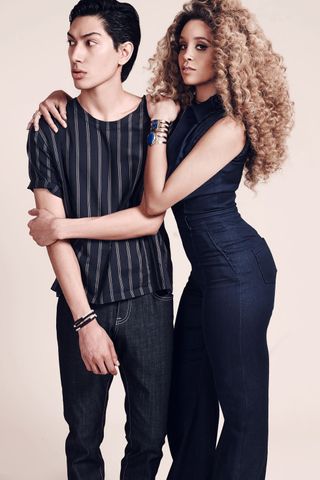
LG: There is definitely a lot of politics and all that stuff. With Jill and I, obviously there are certain things she excels at, or I excel at, and therefore we naturally lean to the other. There are tons of things in the end where people will ask me all these questions about business matters and scheduling and I'm like 'I don't really know, why don't you ask Jill?' And everyone's like 'Oh, we don't want to upset Jill because she's the girl and she's pretty,' but for us it's like, 'What are you talking about?'
Everyone's like, 'Oh, we don't want to upset Jill because she's the girl and she's pretty.'
There are assumptions that I think a lot of people make about her, where here's this beautiful woman who can dance and sing and her skin tone is what it is, so they immediately lump her into a category and therefore also think she will deal and not deal with certain things. I mean, that's just so old and bullshit. For us, we have just been trying to continue to surround ourselves with people who are not like that.
MC: How have you guys evolved to create your new record "Begin" and how does it differ from your previous bodies of work?
JH: Obviously, this is our first album, so this is our first big body of work that's out there in the world and it really represents our journey, from where we started to now and all the music we created, our range, and all the things that we definitely shared, but weren't able to show our range on a full-scale until this album. We created this journey, sonically, that people can really wrap their heads around and live with and get to know us a little bit more. The dark colors, the light colors, our up-tempos, and our down-dreamy stuff. Like Lucas has said, between the people we've met, and the experiences we've had, it's just our growth. It's just something that represents all of what Lion Babe started as and where we're going.
LG: The album title, for us, marks a beginning stage for us and while it might be like, 'But you guys have been out for the past four years,' when we put the first song out, it wasn't even like we were really trying to do this. It was like okay, you can Google Lion Babee if we wanted to get a gig at the random, tiny little place in Brooklyn or the Lower East Side. We had to take a lot of time to not only make more music, but also just learn this whole thing. We were catapulted into it pretty quickly. For us it didn't feel like the gradual climb. There has definitely been a lot of learning from this record, things that we won't want to do again, but overall we're really proud of it and it does show to us all the things that we tried and could do. It feels good to have it finally out. More than anything to be able to share more. For us, it was the longest time of only having four songs out, and we're like, 'But we know we have like 30 songs in my iTunes that are waiting to be heard by the people,' so now we can continue to make more and people can begin to listen, so it feels good.
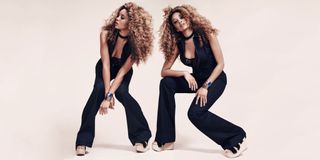
Editor: Lauren Valenti, Photographer: James Ryang, Hair: Tsukisawa Takayoshi, Makeup: Kristin Gallegos at The Wall Group, Stylist: Stephanie Sasso at In Artist Management.
Fashion Credits:
Look 1: Her: JI OH Turtleneck, Wes Gordon dress, Betsey Johnson shoes, Pamela Love rings, and a Bonheur cuff. His: Basic Rights shirt, Belstaff jacket, PLAC jeans, Aquatalia boots, and Robert Geller bracelets.
Look 2: Her: A Piece Apart top, 2NDDAY skirt, Coclico platforms, Coach Sunglasses, and Yuwei Designs earrings.
Look 3: Her: Lonely bra top, Wes Gordon jacket, Alice & Olivia pants, Betsey Johnson platforms, Pamela Love rings, and A Peace Treaty earrings.
Look 4: Her: Alice & Olivia bustier and pants, Aquatalia sandals, Ashley Pittman earrings, Pamela Love rings, and a Bonheur body chain.
Look 5: Her: Va Bien lingerie bustier, Tamara Mellon jumpsuit, Loeffler Randall sandal, Pamela Love rings and cuff, Yuweli Designs Cuff, Yuwei Designs cuff, and a Mignonne Gavigan neck tie. His: Robert Geller shirt and bracelets, PLAC jeans, and Aquatalia boots.
-
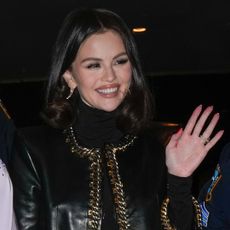 Selena Gomez Quick-Changes Between Rare Designer Looks
Selena Gomez Quick-Changes Between Rare Designer LooksShe's doubling down on luxury.
By Halie LeSavage Published
-
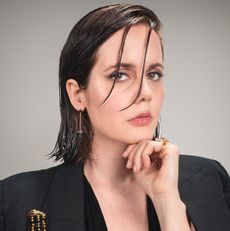 'Yellowjackets' Revealed a Huge Twist About What Happened in the Wilderness. Star Ashley Sutton Told Us All About It
'Yellowjackets' Revealed a Huge Twist About What Happened in the Wilderness. Star Ashley Sutton Told Us All About ItThe actress who plays Hannah has been dying to talk about the Showtime hit's major twist for months.
By Sadie Bell Published
-
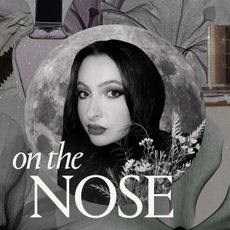 It's Aries Season, Baby—Find Your Horoscope's Fiery Fragrance Soulmate
It's Aries Season, Baby—Find Your Horoscope's Fiery Fragrance SoulmateBecause the perfect scent is written in the stars.
By Aliza Kelly Published
-
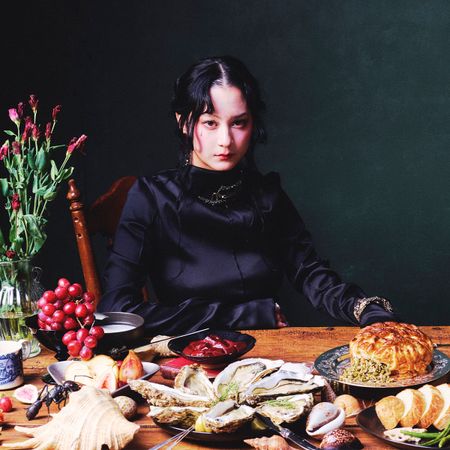 The Melancholic Sound of Success
The Melancholic Sound of SuccessThe artist known as Japanese Breakfast opens up about finding her sound on a new album after experiencing whirlwind success.
By Sadie Bell Published
-
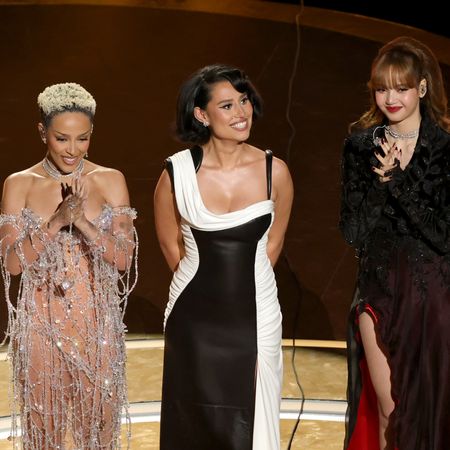 LISA, Doja Cat, and Raye Perform a Glamorous 'James Bond' Tribute at the 2025 Oscars
LISA, Doja Cat, and Raye Perform a Glamorous 'James Bond' Tribute at the 2025 OscarsThe Academy Awards are for the pop girls, actually.
By Quinci LeGardye Published
-
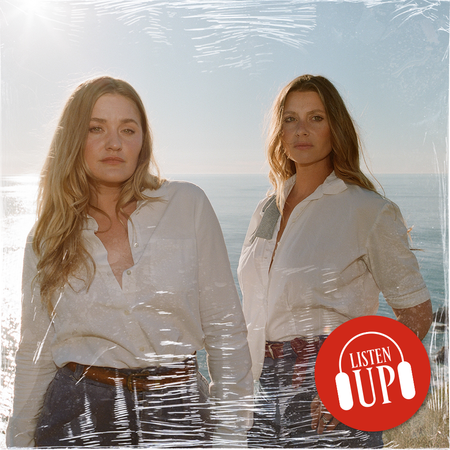 Aly & AJ Share What Music Shaped Them—And What's on Their Playlist Now
Aly & AJ Share What Music Shaped Them—And What's on Their Playlist NowWith their new album 'Silver Deliverer' coming soon, the sister act opens up about their musical preferences for the 'Marie Claire' series "Listen Up."
By Sadie Bell Published
-
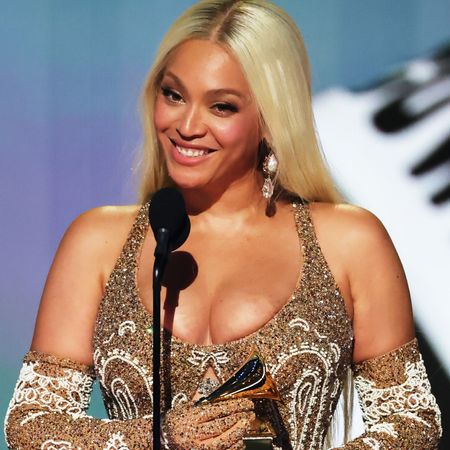 Beyoncé Wins Album of the Year for the First Time Ever at the 2025 Grammys
Beyoncé Wins Album of the Year for the First Time Ever at the 2025 GrammysThe superstar—who has the most wins in the award show's history—took home the biggest prize of the night for 'Cowboy Carter.'
By Sadie Bell Published
-
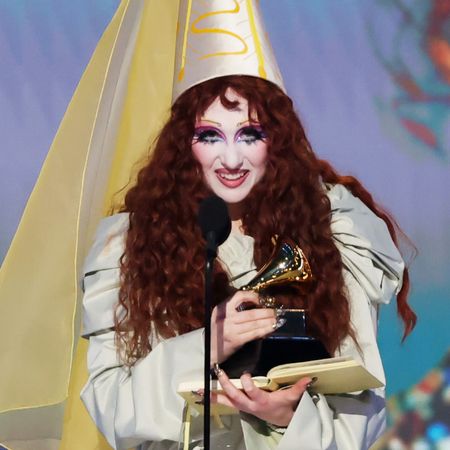 Chappell Roan Wins Best New Artist at the 2025 Grammys—And Called Upon Record Labels to Enact Artist Healthcare Reform
Chappell Roan Wins Best New Artist at the 2025 Grammys—And Called Upon Record Labels to Enact Artist Healthcare ReformThe Midwest Princess made a powerful speech while accepting the award for Best New Artist.
By Quinci LeGardye Published
-
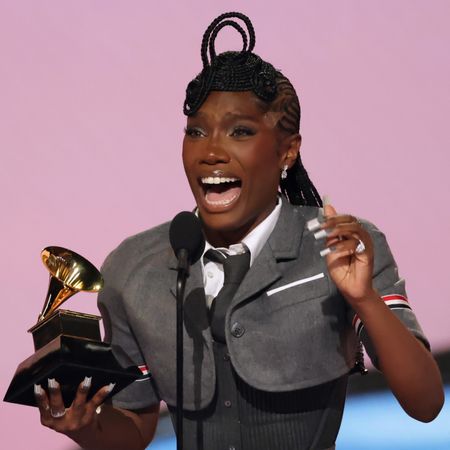 Doechii Wins Best Rap Album at the Grammys and Dedicates the Award to Black Women: "You're Exactly Who You Need to Be"
Doechii Wins Best Rap Album at the Grammys and Dedicates the Award to Black Women: "You're Exactly Who You Need to Be""The Swamp Princess" is the third female rapper to take home the gramophone.
By Quinci LeGardye Published
-
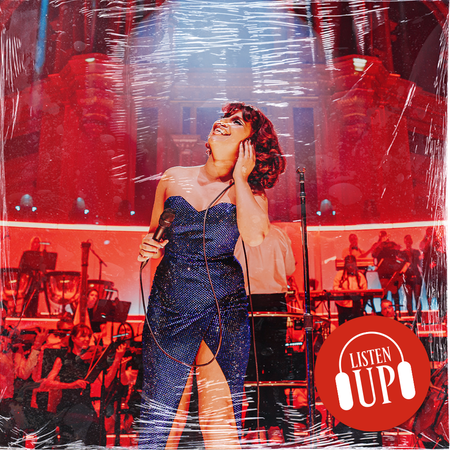 RAYE Shares What Music Shaped Her—And What's on Her Playlist Now
RAYE Shares What Music Shaped Her—And What's on Her Playlist NowThe Best New Artist-nominated singer discusses Britney Spears, Charli xcx, and Nina Simone.
By Quinci LeGardye Published
-
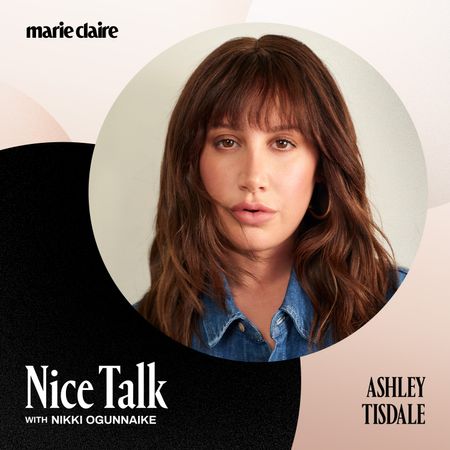 How Failure Felt Like "Business School" for Ashley Tisdale—And Helped Propel Her Brand Forward
How Failure Felt Like "Business School" for Ashley Tisdale—And Helped Propel Her Brand ForwardThe actress, singer, and Frenshe founder speaks to editor-in-chief Nikki Ogunnaike for the 'Marie Claire' podcast "Nice Talk."
By Sadie Bell Published